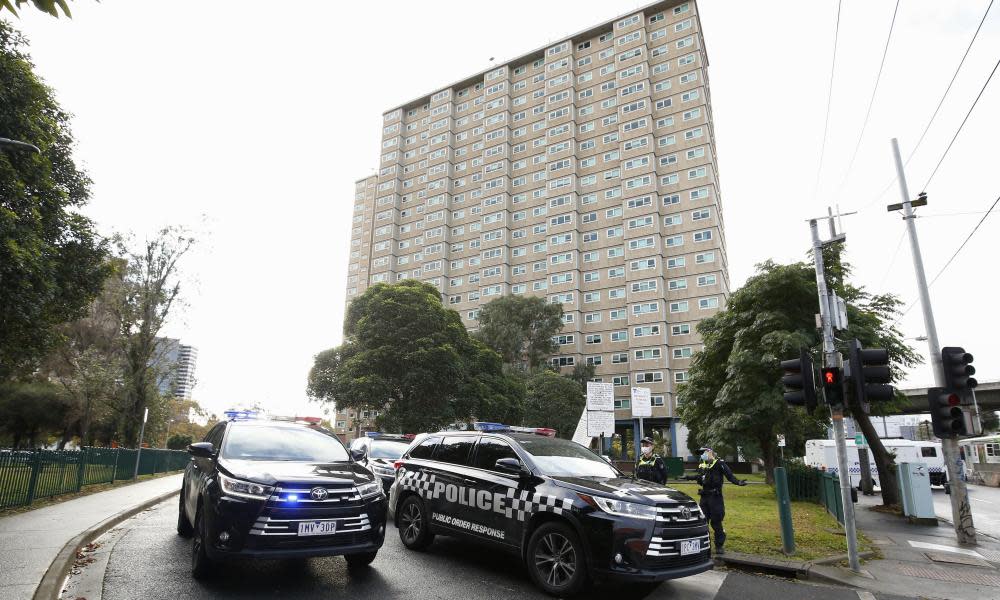‘Explosive potential’: Victoria sends 500 police to contain coronavirus in public housing high-rises

Health authorities in Australia are desperately trying to quash the “explosive potential” of a Covid-19 outbreak across nine public housing towers in Melbourne from escalating into a city-wide lockdown, as rents are waived and hardship allowances are introduced for the 3,000 residents who have been banned from leaving their apartments.
Australia’s acting chief medical officer Paul Kelly labelled the towers at the centre of the outbreaks “vertical cruise ships”, as residents of the nine towers, many of whom are migrants, complained of a lack of food supplies and the size of the police force – 500 on rotating shifts – enforcing the “hard lockdown”.
The heightened restrictions for the buildings were first announced on Saturday, when authorities recorded 108 new cases of Covid-19 in a city which had already placed several postcodes on a softer lockdown days earlier. On Sunday, a further 74 cases were diagnosed in Melbourne, compared with 14 in the state of New South Wales and two in Western Australia.
The source of the majority of Victoria’s new cases is being investigated, as authorities work with epidemiologists and scientists on a genomic sequencing program to aid contact-tracing efforts.
With 543 active coronavirus cases in his state, Victoria’s premier Daniel Andrews acknowledged the hard lockdowns were ““not going to be a pleasant experience for those residents”, many of whom are in “pretty poor health”, but warned if the outbreaks weren’t contained, a city-wide lockdown for Melbourne could be required.
Andrews also prepared the public for greater infection numbers in the coming days, as the results of a testing blitz on the towers’ 3,000 residents are returned.
“It is far more likely that we are going to find what we’re looking for (than finding no infections in the towers),” Andrews said.
“I don’t want people dying in these towers ... We will all feel the impact if this gets away from us comprehensively, because I won’t be looking down 12 postcodes, I will have no choice but to lockdown all postcodes,” he said.
Andrews acknowledged the residents of the towers were particularly vulnerable, saying public health workers, nurses and others had been working “right throughout the night” to provide food, essentials, drug and alcohol support, mental health support, family violence support, physical healthcare.
The state’s chief health officer, Brett Sutton, said the confined nature of the public housing buildings presented a “genuinely explosive potential” for Covid-19 spread, and said authorities had not yet “turned the corner” in containing the cases that they believe have spread between the towers as a result of “a lot of exchange of individuals”.
Writing in the Guardian, resident Hiba Shanino explained most families, with up to five children, live in two or three bedroom flats, with many confused by the information that she said was only distributed in English. Awatif Taha, another resident, has written about the difficulties for residents in obtaining medications and perishable food including milk.
Related: What we know about Victoria's coronavirus public housing tower 'hard lockdowns'
Idris Hassan, 35, lives with his wife and three young children in one of the public housing towers that has been locked down in North Melbourne.
As of 3pm on Sunday, he said he was yet to receive any care packages or food deliveries. No one had visited the family to provide information about what to expect.
“It feels unfair that particular buildings are being locked down while across the street, people are just allowed to go to work and do their other necessities,” he told the Guardian.
Hassan works at Melbourne airport in the export industry and is frustrated he will not be able to go to work tomorrow. He was unimpressed by the $1,500 hardship payments announced by the government, saying he will still be disadvantaged by missing at least a week of work.
“You can’t throw me peanuts and then say, ‘We’re going to take your liberties and freedom and even the right to buy food,’” he said.
“Having said that, I do understand [the importance of] containing the virus ... But I don’t think we’re being dealt a good hand here. It just feels like we’re really being squeezed.”
“As a minority group, it feels like we are soft targets,” added Hassan, whose background is Somali.
“Right now, as we’re speaking, we don’t have milk for the kids,” he said.


